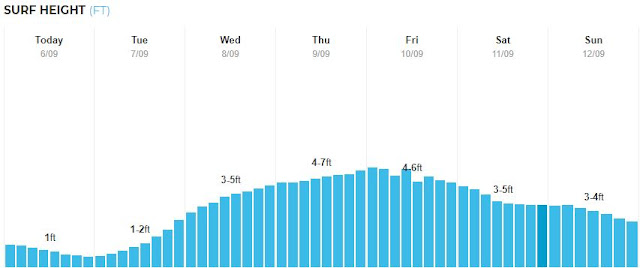 |
| Surf Predictions. Source: MagicSeaWeed.com. |
The big news now is the predicted increase surf for the Treasure Coast. It has been quite a while since we had a good surf. It seems like all summer we have been getting southeast winds and not much surf. Now it looks like we are supposed to get up to as much as seven feet. I think it has been several months since we had anything like that. As I've said before, it doesn't look like the increased surf will be accompanied by the most favorable winds or wave direction, but the high tides are getting higher.
The increased surf is due to Hurricane Larry which is supposed to stay out at sea a good ways. It it takes a path closer to Florida, remains strong and does not pass as quickly, we could receive more effects.
Here is the current predicted track of Larry.
 |
| Source: nhc.noaa.gov |
 |
| Ventusky.com Showing Wind Speeds. |
The wind for 9 AM Wednesday is shown coming from the west. That will go against the swells, maybe making some nicely formed waves but keeping down the swell size.
I'm not really expecting a lot of erosion on the Treasure Coast, but I am expecting some erosion in a few spots that are already low and that can be affected by southeast winds. The higher tides will help some.
---
Finds were recently made on the Atocha site, including four silver coins, several EOs and large pottery shards. Those were all found in the area where the gold coin was found not long ago. More details in the future.
---
I haven't talked much about beach dynamics this year. I've talked a lot about that in the past. It gets pretty complex and difficult to explain in detail. I will however try to give a more detailed explanation in the near future.
There are some good academic archaeology articles on post-depositional processes, but unfortunately they written in academic language that is difficult to understand unless you are familiar with the terminology.
Here is one of those.
Survey Archaeology | Post-depositional Processes
They give the following definition.
All natural and anthropogenic processes that have occurred after the deposition of archaeological materials, and which might have transformed them into their present state. Our understanding of post-depositional processes is vital to assess the possible biases they might have caused in the archaeological record. Some of the most evident examples of post-depositional processes encountered in survey archaeology are erosion and agricultural activities, such as ploughing.
That is needlessly obscure for the average person. It could easily be explained in simple terms, but it applies mostly to land sites anyhow. Beach dynamics are a special case, and when you are talking about sand and coins, which is what we are often interested in, it is a much more specialized area of study.